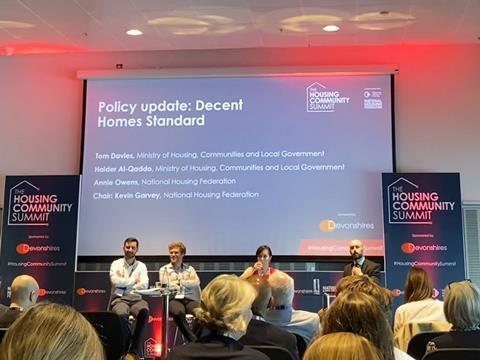Proposed requirement in new Decent Homes Standard would cost Sovereign Network Group £6m a year, CEO tells Housing Community Summit as consultation period nears end
The National Housing Federation (NHF) cannot support the government’s proposed requirement for mandatory floor coverings in social housing unless extra funding is made available, a policy leader said.

Annie Owens, speaking at the Housing Community Summit in Liverpool today, said: “We completely understand how important it is for residents to have good quality carpets floor coverings in their homes.
“However, we have heard a lot of significant concerns about the cost of this as a new requirement for social landlords…We just can’t agree with this being introduced as a new requirement without a firm commitment from the government that additional funding would be in place to ensure that this could be delivered without significantly limiting what else landlords can invest in.”
Mark Washer, chief executive of Sovereign Network Group (SNG), in a different session at the conference, said: “From a regulatory perspective, we’ve estimated that just floor coverings will add £6 million pounds a year to our operating costs.”
He said that “doesn’t sound huge” but it comes on the top of other costs. He said therefore rent convergence at £1 or £2 a week [rather than £3] “doesn’t cut it” given the extra costs facing the sector.
As part of its consultation on a reformed Decent Homes Standard, the Ministry for Housing, Communities and Local Government (MHCLG), is exploring whether to require landlords to provide “suitable floor coverings” in all rooms at the start of every tenancy. The consultation closes on Wednesday.
There is currently no specific legal requirement to provide homes in the social housing sector with floor coverings. Unlike in the private sector, many homes in the social housing sector are let with bare floors. This is because social homes are secure and landlords choose to let properties unfurnished and without floor coverings to allow tenants a choice on what they want in their homes.
In its consultation paper, MHLCG said: “We recognise that the cost of acquiring floor coverings can be a big expense for tenants and for those who simply cannot afford to install floor coverings, resulting in a home being harder to keep warm, less safe and more likely to cause noise issues for other tenants.”
MHCLG, in its consultation paper, said under the requirement landlords would not be held to accountable for providing floor coverings until 2035 at the earliest.
It said it would encourage landlords to consider using floor coverings from a previous tenancy if they are clean, free from hazards and in a reasonable state of repair at the start of the tenancy. It said it thinks “suitable” floor coverings would include carpet, linoleum, tiling and, where they are appropriately finished to be left uncovered, floorboards. Exposed subfloors, such as those made of concrete, plywood, laminated or oriented strand board (OSB) would not be considered suitable.
The Housing Community Summit is an annual conference organised jointly by the National Housing Federation and Chartered Institute of Housing.
More from the Housing Community Summit
NHF warns it can’t support MHCLG’s mandatory floor coverings proposal unless extra funding provided
Rent increases should be linked to energy efficiency of homes, Housing Community Summit hears
MP warns sector not to use delays as reason to row back on building safety reforms
Sector needs ‘short-term solution’ to labour shortages, says Abri CEO











No comments yet